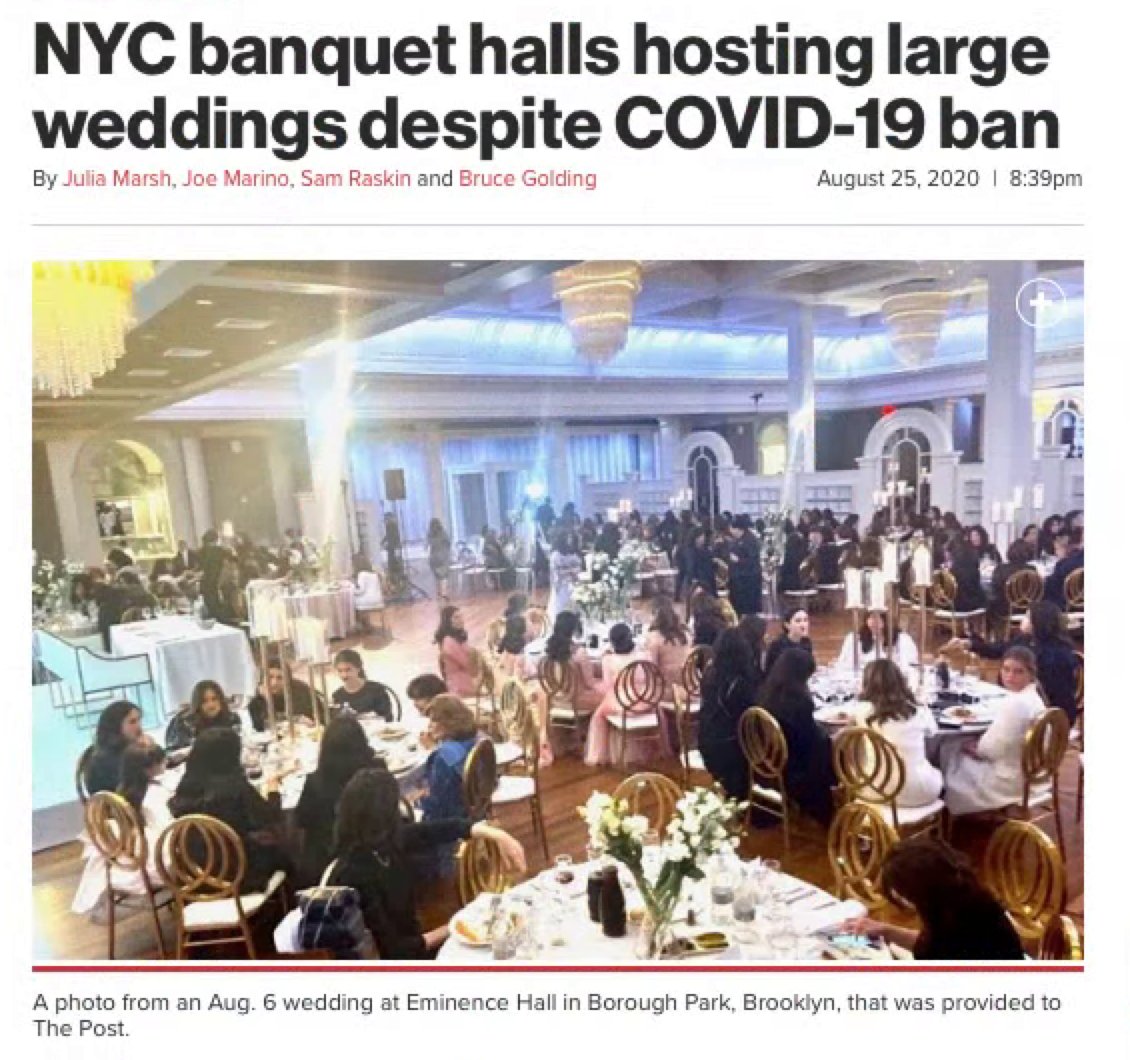Pre-holiday spike triggers new alarm
Fears of a second wave of coronavirus cases in New York City’s Orthodox communities appear to be coming to pass, with the proportion of tests turning up cases of the disease more than four times the citywide rate in Borough Park.
Rising numbers were also reported in other Jewish neighborhoods in NYC, including Far Rockaway, Forest Hills, Midwood, Crown Heights and Williamsburg, as well as on Long Island and in Orthodox areas of New Jersey and Baltimore.
And while many Orthodox leaders were exhorting community members to follow public health recommendations to wear masks and avoid large gatherings, others were expressing defiance, saying they intend to flout rules designed to stop the spread of the disease.
In a video taken at a wedding Sunday where unmasked guests appeared in the background, Borough Park activist and radio host Heshy Tischler vowed to attend a wedding every night no matter what restrictions Gov. Andrew Cuomo and Mayor Bill de Blasio impose.
“Go drop dead, Cuomo, go drop dead, Mayor de Blasio,” said Tischler, who this summer cut the chains off local playgrounds alongside local Orthodox politicians in defiance of the mayor’s orders to keep playgrounds shut. “You’re not coming into my neighborhood, we’re going to do whatever we want.”
New York City revealed Sunday that despite a citywide test positivity rate of less than 1%, Borough Park, home to the largest Hasidic population in the city and one of the neighborhoods with the highest rate of positive cases at the beginning of the pandemic, saw a positivity rate of over 4%, with that number surpassing 6% in part of the neighborhood.
“In recent days, we have observed heightened rates of COVID-19 in many neighborhoods with large Orthodox Jewish populations,” Dr. Dave Chokshi, the city’s health commissioner, wrote to local Orthodox media outlets on Sunday.
Spikes in positivity rates began around Aug. 15, two weeks after Tisha B’Av when Orthodox weddings resumed following the three weeks.
Several Jewish wedding halls have been observed hosting large weddings without masks. According to the New York Post, one wedding hall in Borough Park placed paper in the windows and had guests enter through a side entrance, seemingly to avoid detection.
Many in the neighborhoods spent the summer operating under the assumption that widespread sickness in the spring had conferred some protections going forward. The resumption of weddings and often crowded in-person synagogue services without an accompanying uptick in disease early in the summer reinforced that sense of safety for many.
Doctors in Orthodox communities started seeing slight upticks in cases last month, with some coming from summer camps, bungalow colonies and weddings. Branches of Hatzalah issued warnings of increased COVID-related calls and hospitalizations in Rockland and Brooklyn.
As cases continued ticking upwards, a consensus has solidified around the idea that weddings are the primary cause of the new cases. While a typical Orthodox wedding might have more than 400 guests, social gatherings of more than 50 people are not currently permitted in New York State due to coronavirus restrictions.
Rabbinical councils in Baltimore, Bergen County and Cleveland have all warned of the effects of large weddings. An open letter from 138 Jewish doctors in the Five Towns, published in last week’s Jewish Star, connected new local cases to large weddings and asked the community to trust in medical professionals.
Compounding the threat of large weddings is the fact that relatively few people attending them wear masks.
Dr. Stuart Ditchek, a pediatrician in heavily Syrian Midwood, said the health department noted a positivity rate of close to 4% in part of that neighborhood.
“There have been over 100 new infections in Deal this week alone,” Ditchek said, fearing those cases could seed new ones in Midwood as Brooklyn residents with summer homes in Deal return home for the school year.
“You can see why this is a conglomeration of events that’s really troubling to the health department,” he said.
Ditchek warned that the safe continued functioning of schools was the most important issue in controlling the new infections in the Orthodox communities.
“I think if we are very vigilant, we can still put this thing to sleep,” said Ditchek. “If the cases continue to accelerate at the rate we’re seeing this week, it’s going to make for a very difficult time right around the Yom Tovim.”

 55.0°,
Overcast
55.0°,
Overcast 




